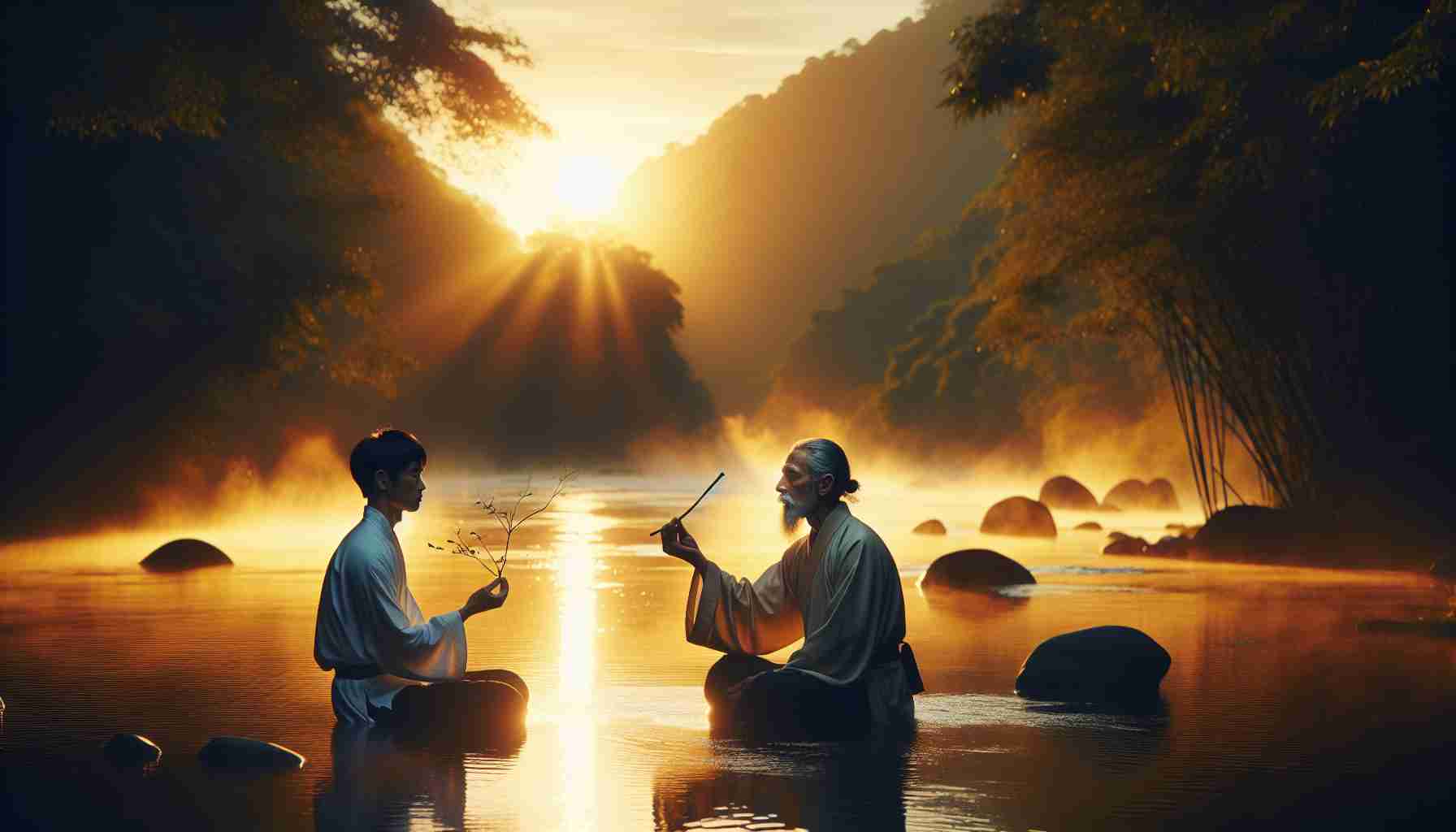

The sun had already begun to dip below the hills when old Master Wei and I reached the edge of the quiet river. My legs ached from the long walk, but I didn’t complain. Master Wei was not only my teacher—he was the wisest man I knew, trusted by elders and children alike. I had been his student for months, but today felt different, like something important was about to happen.
We sat by the riverbank in silence. Master Wei didn’t speak, and I followed his lead. The water shimmered gently, flowing around the smooth stones with no resistance. It looked so peaceful, so effortless.
Finally, Master Wei broke the silence. “Do you know Laozi’s teaching from the 40th verse?” he asked softly, his eyes still on the river.
I shook my head. “No, Master.”
He nodded. “It says that everything in the world comes from being. But being itself comes from non-being.”
I blinked. That made no sense. “How can something come from nothing?” I asked, confused.
Master Wei didn’t answer right away. Instead, he picked up a small twig and dropped it into the water. We watched it float quietly along the current. “This twig,” he said, “does not fight the river. It moves not by trying, but by letting go. That is what is called Wu Wei—non-action, or effortless action.”
I furrowed my brow. “So… doing nothing gets things done?”
He turned to me and smiled. “Not quite. It is not about doing nothing. It is about not forcing. Look at the trees, the wind, the river. Do they argue with the world? No. They move in harmony with it. That harmony is the Tao—the Way.”
I thought about that as the wind wrapped gently around us. I had always believed that effort meant achievement. I worked hard at school, tried to get things just right, and still often felt tired and frustrated.
“Sometimes,” I muttered, “I just feel like I’m pushing too hard.”
Master Wei nodded knowingly. “That’s because you are. When you try to control too much, you end up fighting the flow of life. Just like someone trying to push the river backward.”
We sat a little longer, watching the twilight paint colors across the sky. Somehow, I felt lighter.
In the days that followed, I stopped trying so hard to be perfect. I still studied and practiced, but now I let things unfold more naturally. I listened more than I spoke. I noticed more than I tried to change.
I didn’t change overnight. But now, whenever I feel the urge to push too hard, I remember the river and the twig. I try to let things unfold as they are, trusting that I don’t need to fight the flow to find my way.
And slowly, I began to understand Laozi’s wisdom: that from letting go, everything begins.
The sun had already begun to dip below the hills when old Master Wei and I reached the edge of the quiet river. My legs ached from the long walk, but I didn’t complain. Master Wei was not only my teacher—he was the wisest man I knew, trusted by elders and children alike. I had been his student for months, but today felt different, like something important was about to happen.
We sat by the riverbank in silence. Master Wei didn’t speak, and I followed his lead. The water shimmered gently, flowing around the smooth stones with no resistance. It looked so peaceful, so effortless.
Finally, Master Wei broke the silence. “Do you know Laozi’s teaching from the 40th verse?” he asked softly, his eyes still on the river.
I shook my head. “No, Master.”
He nodded. “It says that everything in the world comes from being. But being itself comes from non-being.”
I blinked. That made no sense. “How can something come from nothing?” I asked, confused.
Master Wei didn’t answer right away. Instead, he picked up a small twig and dropped it into the water. We watched it float quietly along the current. “This twig,” he said, “does not fight the river. It moves not by trying, but by letting go. That is what is called Wu Wei—non-action, or effortless action.”
I furrowed my brow. “So… doing nothing gets things done?”
He turned to me and smiled. “Not quite. It is not about doing nothing. It is about not forcing. Look at the trees, the wind, the river. Do they argue with the world? No. They move in harmony with it. That harmony is the Tao—the Way.”
I thought about that as the wind wrapped gently around us. I had always believed that effort meant achievement. I worked hard at school, tried to get things just right, and still often felt tired and frustrated.
“Sometimes,” I muttered, “I just feel like I’m pushing too hard.”
Master Wei nodded knowingly. “That’s because you are. When you try to control too much, you end up fighting the flow of life. Just like someone trying to push the river backward.”
We sat a little longer, watching the twilight paint colors across the sky. Somehow, I felt lighter.
In the days that followed, I stopped trying so hard to be perfect. I still studied and practiced, but now I let things unfold more naturally. I listened more than I spoke. I noticed more than I tried to change.
I didn’t change overnight. But now, whenever I feel the urge to push too hard, I remember the river and the twig. I try to let things unfold as they are, trusting that I don’t need to fight the flow to find my way.
And slowly, I began to understand Laozi’s wisdom: that from letting go, everything begins.